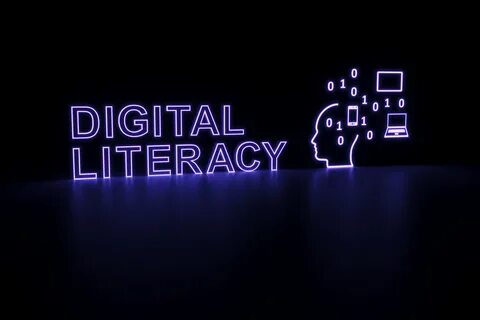Introduction: The Secret Weapon No One Tells You About
Every year, millions of students around the world compete for scholarships — hoping to secure funding that can transform their education and future. But here’s the reality: talent alone isn’t enough anymore.
In a world where scholarship committees sift through thousands of applications online, digital literacy — your ability to effectively use technology and digital tools — can become your most powerful advantage.
It’s no longer just about good grades or a persuasive essay. Today, it’s about how well you can use the internet, research tools, and digital applications to make your story stand out.
Think of it this way: in the 21st-century scholarship race, digital literacy isn’t just a skill — it’s your competitive edge.
What Exactly Is Digital Literacy (and Why Should You Care)?
Digital literacy goes beyond knowing how to use a smartphone or browse the web. It’s the ability to find, evaluate, create, and communicate information using digital technology.
It combines technical skills (like using software or search engines) and critical thinking (like identifying credible sources or presenting ideas online).
In simple terms:
Digital literacy is what allows you to:
- Fill out online scholarship applications smoothly.
- Research opportunities others might miss.
- Communicate professionally via email and online interviews.
- Design a standout résumé or digital portfolio.
When universities and organizations look at applicants, they’re not just evaluating who you are now — they’re also predicting how you’ll perform in a digital-first world.
That’s why mastering digital literacy can help you rise above thousands of applicants who still rely on old-fashioned methods.
How Scholarships Have Gone Digital
The scholarship landscape has shifted. Most opportunities are now entirely online — from application portals to essay submissions and interviews.
| Stage | Traditional Process | Modern, Digital Process |
|---|---|---|
| Finding Scholarships | Local notices or posters | Online search engines & portals |
| Application Submission | Paper forms | Online portals like Scholarship Portal |
| Essay Writing | Handwritten essays | Digital document uploads & plagiarism checks |
| Interview Process | Physical interviews | Virtual interviews via Zoom or Teams |
| Updates & Notifications | Postal letters | Emails, websites, or app notifications |
Today’s scholarships require you to be digitally smart, not just academically brilliant. Knowing how to navigate these online systems, meet formatting requirements, and communicate professionally online is what separates the successful from the rest.
The Power of Digital Literacy in Scholarship Applications
So how exactly does being digitally literate give you an edge? Let’s break it down.
1. You Find More Opportunities Than Others
Students who know how to research online can uncover scholarships that others never see.
They use search operators, filters, and keywords like “fully funded scholarships 2025 site:.edu” to locate hidden gems. They also set alerts and join digital communities like LinkedIn or Reddit groups dedicated to scholarships.
According to UNESCO’s Global Education Monitoring Report, digital literacy helps learners “navigate, evaluate, and apply knowledge in ways that improve access and participation.”
In simple terms: digital-savvy students find more opportunities — and apply faster.
2. You Craft Stronger, More Polished Applications
Scholarship panels can spot the difference between an amateur application and a digitally polished one.
Digitally literate applicants:
- Format essays properly in Word or Google Docs.
- Use plagiarism tools like Grammarly to refine writing.
- Create organized folders for documents and references.
- Submit PDF files with professional naming conventions (e.g., “John_Doe_ScholarshipEssay.pdf”).
These small details show attention to professionalism — something that impresses reviewers immediately.
3. You Communicate Like a Professional
In the digital world, your email is your handshake, and your Zoom call is your interview suit.
Digitally skilled students know how to:
- Write clear, polite emails to scholarship coordinators.
- Attend online interviews confidently with stable audio and video.
- Use LinkedIn to connect with past recipients or mentors.
Effective communication builds credibility — and that’s half the battle in scholarship selection.
4. You Create a Strong Online Presence
Your online presence can either open doors or shut them.
Scholarship committees sometimes look up applicants online. A clean, professional digital footprint — a polished LinkedIn profile, digital portfolio, or personal blog — shows initiative and maturity.
This is where digital literacy shines. It helps you:
- Build an online portfolio of achievements.
- Showcase volunteer projects and certifications.
- Use social media responsibly and strategically.
Your digital footprint tells your story long before your essay does.
5. You Adapt Quickly to Digital Scholarship Platforms
Most scholarships now use web-based systems for applications, essay uploads, and document verification.
If you’ve ever struggled with online portals or file conversions, you know how frustrating it can be. Digital literacy simplifies this. You’ll easily:
- Compress PDFs for uploads.
- Convert file types (e.g., Word → PDF).
- Navigate multi-step online forms confidently.
- Track deadlines using Google Calendar or Notion.
It’s not just about convenience — it’s about staying calm and in control while others panic under digital pressure.
Real-Life Examples: How Digital Skills Changed the Game
1: From Overlooked to Awarded
Sarah, a student in Ghana, spent years applying for scholarships with no luck. When she learned to use LinkedIn and Google Scholar, she started discovering niche programs for African students.
Within six months, she landed a fully funded STEM scholarship in Canada — simply because she knew where and how to look.
2: Turning a Portfolio into a Ticket
James, a Nigerian art student, built a digital portfolio using Behance and Canva. He embedded it in his scholarship essay to showcase his design projects.
The panel was impressed — not just by his art, but by his ability to use digital tools creatively. He won a design fellowship that paid for his tuition and software licenses.
These stories highlight a truth: being digitally literate doesn’t just help — it multiplies your chances of success.
Key Digital Skills That Boost Scholarship Success
So, what specific digital skills do you need to stand out? Here’s a list to focus on:
Core Skills:
- Online Research: Advanced searching, verifying credible sites.
- Word Processing: Microsoft Word, Google Docs formatting.
- Data Management: Organizing files in Google Drive or Dropbox.
- Presentation Tools: PowerPoint, Canva, or Prezi for visual impact.
- Email Etiquette: Professional tone and subject lines.
Advanced Skills:
- Portfolio Design: Using tools like Notion, Behance, or Wix.
- Video Communication: Zoom, Google Meet interview readiness.
- Cybersecurity Awareness: Keeping personal data safe.
- AI Assistance: Using ChatGPT or Grammarly ethically to improve writing clarity.
A student with these abilities doesn’t just apply — they stand out.
Comparison: Digitally Literate vs. Digitally Limited Applicants
| Feature | Digitally Literate Student | Digitally Limited Student |
|---|---|---|
| Research | Uses advanced online tools | Relies on word-of-mouth |
| Essays | Proofread with Grammarly or AI tools | Submits unedited drafts |
| Application Files | Properly formatted, named, and uploaded | Disorganized or incompatible files |
| Online Presence | Maintains LinkedIn or portfolio | Nonexistent or unprofessional |
| Interview Skills | Confident in virtual setups | Nervous or technically unprepared |
The difference is clear — one is future-ready, the other is falling behind.
The Role of Digital Literacy in Scholarship Interviews
Virtual interviews are now the norm for global scholarships like Chevening, DAAD, or Erasmus Mundus.
Here’s how digital literacy gives you an advantage:
- You can set up a professional virtual background.
- You understand body language through a webcam.
- You know how to test microphones and lighting.
- You can share digital presentations seamlessly.
These small technical details can determine whether your interview goes smoothly or ends awkwardly.
Remember: preparation meets opportunity online.
Tools Every Scholarship Applicant Should Master
| Tool Type | Examples | How It Helps |
|---|---|---|
| Writing & Editing | Grammarly, Hemingway | Improves essay clarity |
| Portfolio Building | Canva, Wix, Behance | Displays achievements visually |
| File Conversion | SmallPDF, Adobe Acrobat | Simplifies submission formats |
| Organization | Google Drive, Notion | Keeps documents accessible |
| Interview Prep | Zoom, Google Meet | Enables confident virtual presence |
Mastering these tools not only saves time but also demonstrates your technical maturity — a valuable trait for scholarship selectors.
The Digital Edge Beyond Scholarships
Here’s the beauty of it all: once you build digital literacy, it benefits you beyond scholarship applications.
You’ll find it easier to:
- Apply for remote internships and fellowships.
- Communicate with international professors.
- Build side projects or online portfolios.
- Create LinkedIn content that attracts opportunities.
Digital literacy isn’t a one-time skill — it’s a lifelong investment.
Avoiding Digital Pitfalls in Scholarship Applications
While digital literacy opens doors, misuse of technology can close them. Avoid these common mistakes:
- Copy-pasting from the internet. Scholarship committees use plagiarism checkers.
- Over-relying on AI. Tools like ChatGPT are great, but your voice matters more.
- Ignoring deadlines. Digital calendars exist — use them.
- Using unprofessional email addresses. Replace cutegirl2002@gmail.com with jane.adams@gmail.com.
A digitally smart applicant knows how to use tools ethically and responsibly.
Conclusion: The Scholarship Winners of Tomorrow Are Digitally Literate
In a world dominated by technology, being digitally literate isn’t optional — it’s essential.
Scholarships no longer reward only intelligence; they reward adaptability, professionalism, and creativity — all of which are powered by digital literacy.
When you can research effectively, write with clarity, organize your documents, and present yourself professionally online, you don’t just apply for scholarships you command attention.
So, invest in learning digital tools. Explore, practice, and evolve. Because the next time you click “Submit,” your digital edge might just be the reason you win.


